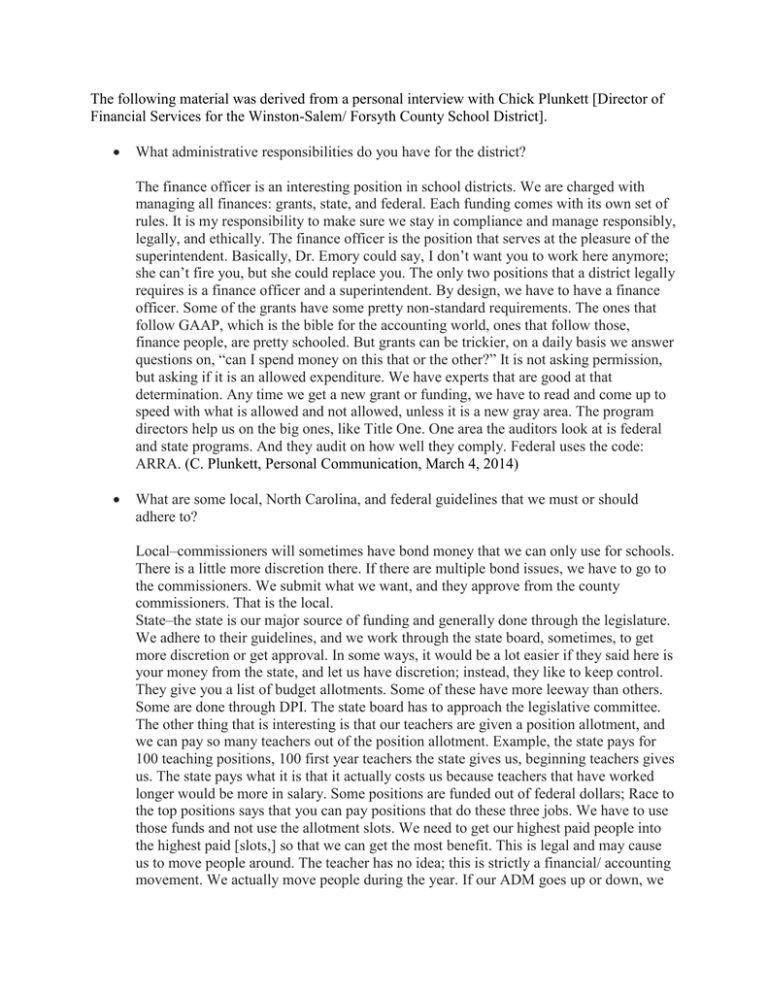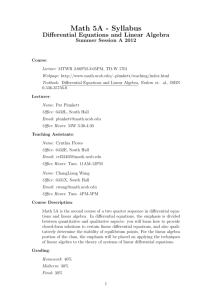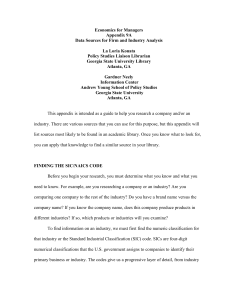The following material was derived from a personal interview with
advertisement

The following material was derived from a personal interview with Chick Plunkett [Director of Financial Services for the Winston-Salem/ Forsyth County School District]. What administrative responsibilities do you have for the district? The finance officer is an interesting position in school districts. We are charged with managing all finances: grants, state, and federal. Each funding comes with its own set of rules. It is my responsibility to make sure we stay in compliance and manage responsibly, legally, and ethically. The finance officer is the position that serves at the pleasure of the superintendent. Basically, Dr. Emory could say, I don’t want you to work here anymore; she can’t fire you, but she could replace you. The only two positions that a district legally requires is a finance officer and a superintendent. By design, we have to have a finance officer. Some of the grants have some pretty non-standard requirements. The ones that follow GAAP, which is the bible for the accounting world, ones that follow those, finance people, are pretty schooled. But grants can be trickier, on a daily basis we answer questions on, “can I spend money on this that or the other?” It is not asking permission, but asking if it is an allowed expenditure. We have experts that are good at that determination. Any time we get a new grant or funding, we have to read and come up to speed with what is allowed and not allowed, unless it is a new gray area. The program directors help us on the big ones, like Title One. One area the auditors look at is federal and state programs. And they audit on how well they comply. Federal uses the code: ARRA. (C. Plunkett, Personal Communication, March 4, 2014) What are some local, North Carolina, and federal guidelines that we must or should adhere to? Local–commissioners will sometimes have bond money that we can only use for schools. There is a little more discretion there. If there are multiple bond issues, we have to go to the commissioners. We submit what we want, and they approve from the county commissioners. That is the local. State–the state is our major source of funding and generally done through the legislature. We adhere to their guidelines, and we work through the state board, sometimes, to get more discretion or get approval. In some ways, it would be a lot easier if they said here is your money from the state, and let us have discretion; instead, they like to keep control. They give you a list of budget allotments. Some of these have more leeway than others. Some are done through DPI. The state board has to approach the legislative committee. The other thing that is interesting is that our teachers are given a position allotment, and we can pay so many teachers out of the position allotment. Example, the state pays for 100 teaching positions, 100 first year teachers the state gives us, beginning teachers gives us. The state pays what it is that it actually costs us because teachers that have worked longer would be more in salary. Some positions are funded out of federal dollars; Race to the top positions says that you can pay positions that do these three jobs. We have to use those funds and not use the allotment slots. We need to get our highest paid people into the highest paid [slots,] so that we can get the most benefit. This is legal and may cause us to move people around. The teacher has no idea; this is strictly a financial/ accounting movement. We actually move people during the year. If our ADM goes up or down, we may move 50 or 100 people around because funding has moved or they have allowed extra discretion. The game that we are playing is to spend every penny of state and federal money, and you spend it by the end of the fiscal year or give it back. One of the audit hits that we get is that we overspend our state allotment and have to pay it back. We overspend it on purpose because we don’t want to send it back. The state will also give you 90 days with no interest or penalty. We do get dinged on our audit, but we know it, and everyone including the board knows it. Supplanting rules are the states attempt to not let school districts play a shell game–this money is to be in an addition to, it is not to replace. The general assembly likes to control those dollars. It is not to replace it; it won’t allow the shell game. The word supplant will actually be in the language. Grant or funding, PRC codes (purpose codes) have explanation. They micromanage through using purpose codes. One of the big things for our district is CTE funding; we have more than we can spend. We have a lot of programs around CTE; we can’t use all of it because we don’t have enough demand from the students to fill the classes. The money can go unused. I am sure that is not the case for a small county that may have more demand, as they have more students that would need it. More of our students are college oriented and aren’t interested in taking the career classes. That is a big example of the state controlling the funds and creating hardships. 115 LEAs and 100 counties is how the state is divided; it is interesting that we allow that instead of having each county as a LEA. Instead of giving us a pot of money, it is almost laughable that the General Assembly gives us the pots of money and tells you how you will spend it. The needs would be different for a large and small district. One we laughed at was the new money they gave us to fund camera on school bus stop arms. Most districts are having trouble finding money to fund it, [the] state decided to fund it. The state started funding with 2 cameras per year per bus. We run 350 plus buses, so it will take us many years to get the cameras on our busses, yet some districts will have almost all their buses done. If you think about it, a county that has 5,000 students doesn’t have the ability to have a budget director and a finance director. I think we could do a better job with one pot. I think we have the education and resources. For a district our size, some of the decisions are based on funding rather than what the district needs. Controls are a good thing because they do help some districts, in our instance they often do not. (C. Plunkett, Personal Communication, March 4, 2014) Federal, ARRA, American Recovery and Reinvestments Act resulted in race to the top funding. Any purchase greater than 5,000 had to have approval. We would go and post on a website to get a wider audience of participating. The intent is to get a good price. There is the same thing with position. The positions have to post through the employment security commission. If the position is paid with ARRA funds, we missed the requirement early. (C. Plunkett, Personal Communication, March 4, 2014) What training programs do we offer or would you like to offer? From a finance standpoint, we don’t really offer any real training programs. We do train the financial secretaries in the schools. We try to hire people that have a background in finance. Our department does spend time with people when they are hired. We send out emails on daily procedures; we give them money. This department is responsible for auditing the schools–the principal is ultimately responsible. The principal and the secretary are the only people that can sign. If they are unavailable, then I have to sign. That is one of the safeguards we have in place. I would like to see more formal training for the financial secretaries. We also don’t have a pool of candidates. For example, we have an opening and the people left for higher paying positions. (C. Plunkett, Personal Communication, March 4, 2014) How would you improve our district budget and are there any concerns? More control over it–we could make instructional decisions based on instructional factors rather than funding decisions. (C. Plunkett, Personal Communication, March 4, 2014) We don’t have to use the state contract, if we can beat their price. For example, paper products, a local distributer will give us a deal. It is always good to have the state contract because it does give us a ready checkpoint. My understanding was that [we] had to use the state contract. The caveat is you can do better than the contract. (C. Plunkett, Personal Communication, March 4, 2014) What would you like a superintendent to know about the budget? The budget is like not a standardized way. EC is more complicated, not a standard process. Sam Dempsy’s presentation was very helpful too– educational for our superintendent, at the end of the process. When we get through our last budget meeting, we will have decisions made–here is the pot of money. We have to divide it up. We will have more requests than money. Dr. Emory makes the decisions. Every department head becomes a salesman. The needs take care of themselves. Our contracts with our auditors, our financial software, and for the schools, and then I have a 2500 line-item for office supplies. The rest of the stuff is farmed out under a director like Guy. Mine is pretty cut and dry, but if Guy wants the new piece of equipment for the print shop. (C. Plunkett, Personal Communication, March 4, 2014) We usually attend about every board meeting. There might me a month we do or not have one. Some of that is required, because the budget will be approved. The preliminary budget will be in about 3 months, and then the state budget has to be improved. If they decide to cut or add, then we amend for the final approval. The general assembly didn’t even pass one last year until after June 30. There are tweaks that had to be made based on it being passed. (C. Plunkett, Personal Communication, March 4, 2014) Right now, we have a local fund balance. Now we have a 12 million fund balance; we are trying to build that each year. It is hard to do with no excess funds. We used to have to go to the county commissioners, now we have a small local cushion. Again, the board has to be comfortable if we dip in. That is how we could keep the teaching assistants. (C. Plunkett, Personal Communication, March 4, 2014) The state made some funding available for resources officers, and they would pay 75% and the district would pay the rest. Sustainability became the question. If we came up with the 25% to match, and if in two years the state funding goes away–How hard would it be to have them not be there? We chose not to apply for the grant because we saw it is not sustainable. If you needed it anyway, you might would take [it], if it were an expenditure you were planning on taking, you might take it and hope it gets extended. (C. Plunkett, Personal Communication, March 4, 2014) With the 25% plan, the General Assembly might fund it–You were at the last board meeting and the state is only guaranteeing the payment of the first year. Behind closed doors, we think that would be suicide to pull funding, but anything is possible. The fact that they put that new rule in there means you have to pay them 500 dollars of the contract, and we are only guaranteeing funding for the first year. That is a big part of the concern–you are making business concerns on the unknowns. We have to prepare for the contingent liability, and if we have 500 teachers on the contract–it almost feels like a shell game. Unlike the public sector, running the finances of a school district you have very little control of the revenue side. All of our efforts are focused on the expense side. We are very dependent on the revenue. We do a few things with contracts, but it is minor, like with Pepsi. As a whole, we have no revenue generating capabilities. It seems like we shuffle things around because some you can move; however, some are limited and broad. Also, our instructional allotment has to be used on instruction. (C. Plunkett, Personal Communication, March 4, 2014)






